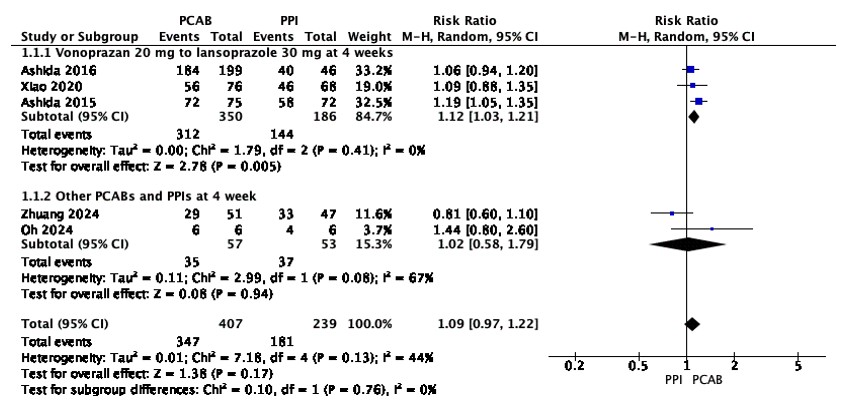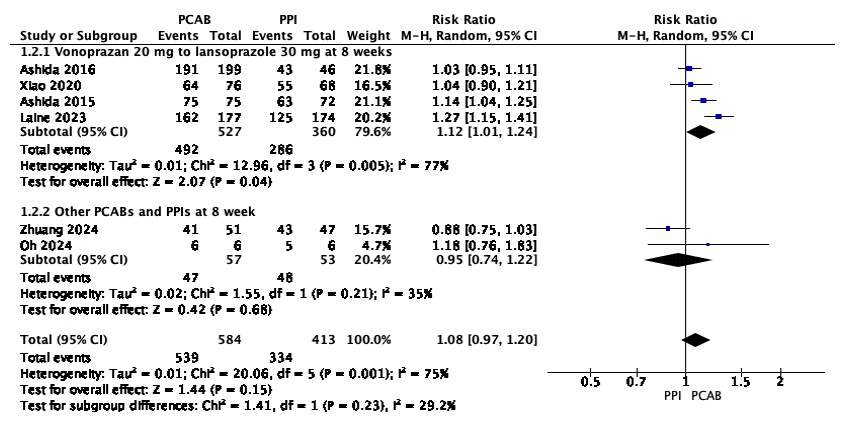Monday Poster Session
Category: Esophagus
P2754 - Potassium-Competitive Acid Blockers Versus Proton Pump Inhibitors in Patients With Grade C and D Erosive Esophagitis: A Meta-Analysis
Monday, October 27, 2025
10:30 AM - 4:00 PM PDT
Location: Exhibit Hall
- EH
Eddie T. He, BSc (he/him/his)
Michael G. DeGroote School of Medicine, McMaster University
Toronto, ON, Canada
Presenting Author(s)
Eddie T. He, BSc1, Sunil Samnani, MBBS2, Mohammad Yaghoobi, MD, MSc, FACG2, Yuhong Yuan, MD, PhD2, Richard H. Hunt, MBChB, MACG3
1Michael G. DeGroote School of Medicine, McMaster University, Toronto, ON, Canada; 2McMaster University, Hamilton, ON, Canada; 3McMaster University, Farncommbe Digestive Health Research Institute, Midhurst, England, United Kingdom
Introduction: Severe erosive esophagitis, defined as Los Angeles Classification Grades C and D, remains a therapeutic challenge due to suboptimal healing rates despite treatment with proton pump inhibitors (PPIs). Potassium-competitive acid blockers (PCABs), which provide more potent and sustained acid suppression, may offer improved healing outcomes. We conducted a meta-analysis to compare the efficacy and safety of PCABs versus PPIs in patients with Grade C or D erosive esophagitis.
Methods: A comprehensive electronic search was conducted through February 2025 to identify randomized controlled trials (RCTs) comparing PCABs and PPIs in this patient population. The primary outcome was endoscopic healing at 4 and 8 weeks. Risk ratios (RRs) with 95% confidence intervals (CIs) were pooled using a random-effects model (RevMan 5.4.1) to account for heterogeneity. Risk of bias was assessed using the Cochrane Risk of Bias 2 tool. A subgroup analysis was performed comparing studies with equivalent doses of the same PCAB and PPI.
Results: Six RCTs involving 2,836 patients (1,433 receiving PCABs and 1,403 receiving PPIs) were included from 1,208 citations. The studies evaluated Vonoprazan, Zastaprazan, and Fexuprazan (PCABs), and Lansoprazole and Esomeprazole (PPIs). In the subgroup analysis of four studies comparing vonoprazan 20 mg with lansoprazole 30 mg, vonoprazan demonstrated significantly higher healing rates at both 4 and 8 weeks: RR 1.12 (95% CI: 1.03 – 1.21, p = 0.005) at 4 weeks, and RR 1.12 (95% CI: 1.01 – 1.24, p = 0.005) at 8 weeks. After including the two additional studies comparing other PCABs and PPIs, the pooled RR at 4 weeks was 1.09 (95% CI: 0.97 – 1.22, p = 0.76), and at 8 weeks was 1.08 (95% CI: 0.97 – 1.20, p = 0.23).
Discussion: In our meta-analysis of equivalent doses and agents, PCABs demonstrated superior healing rates compared to PPIs in patients with Grade C and D erosive esophagitis. These findings support considering PCABs as a preferred first-line therapy in severe cases. Faster mucosal healing may translate into reduced healthcare utilization and improved long-term outcomes.

Figure: Figure 1A: PCABs versus PPIs for grade C/D erosive esophagitis at 4 weeks

Figure: Figure 1B: PCABs versus PPIs for grade C/D erosive esophagitis at 8 weeks
Disclosures:
Eddie He indicated no relevant financial relationships.
Sunil Samnani indicated no relevant financial relationships.
Mohammad Yaghoobi indicated no relevant financial relationships.
Yuhong Yuan indicated no relevant financial relationships.
Richard Hunt: Carnot, – Occasional speaker. Daewoo – Advisor or Review Panel Member. Phathom – Advisor or Review Panel Member.
Eddie T. He, BSc1, Sunil Samnani, MBBS2, Mohammad Yaghoobi, MD, MSc, FACG2, Yuhong Yuan, MD, PhD2, Richard H. Hunt, MBChB, MACG3. P2754 - Potassium-Competitive Acid Blockers Versus Proton Pump Inhibitors in Patients With Grade C and D Erosive Esophagitis: A Meta-Analysis, ACG 2025 Annual Scientific Meeting Abstracts. Phoenix, AZ: American College of Gastroenterology.
1Michael G. DeGroote School of Medicine, McMaster University, Toronto, ON, Canada; 2McMaster University, Hamilton, ON, Canada; 3McMaster University, Farncommbe Digestive Health Research Institute, Midhurst, England, United Kingdom
Introduction: Severe erosive esophagitis, defined as Los Angeles Classification Grades C and D, remains a therapeutic challenge due to suboptimal healing rates despite treatment with proton pump inhibitors (PPIs). Potassium-competitive acid blockers (PCABs), which provide more potent and sustained acid suppression, may offer improved healing outcomes. We conducted a meta-analysis to compare the efficacy and safety of PCABs versus PPIs in patients with Grade C or D erosive esophagitis.
Methods: A comprehensive electronic search was conducted through February 2025 to identify randomized controlled trials (RCTs) comparing PCABs and PPIs in this patient population. The primary outcome was endoscopic healing at 4 and 8 weeks. Risk ratios (RRs) with 95% confidence intervals (CIs) were pooled using a random-effects model (RevMan 5.4.1) to account for heterogeneity. Risk of bias was assessed using the Cochrane Risk of Bias 2 tool. A subgroup analysis was performed comparing studies with equivalent doses of the same PCAB and PPI.
Results: Six RCTs involving 2,836 patients (1,433 receiving PCABs and 1,403 receiving PPIs) were included from 1,208 citations. The studies evaluated Vonoprazan, Zastaprazan, and Fexuprazan (PCABs), and Lansoprazole and Esomeprazole (PPIs). In the subgroup analysis of four studies comparing vonoprazan 20 mg with lansoprazole 30 mg, vonoprazan demonstrated significantly higher healing rates at both 4 and 8 weeks: RR 1.12 (95% CI: 1.03 – 1.21, p = 0.005) at 4 weeks, and RR 1.12 (95% CI: 1.01 – 1.24, p = 0.005) at 8 weeks. After including the two additional studies comparing other PCABs and PPIs, the pooled RR at 4 weeks was 1.09 (95% CI: 0.97 – 1.22, p = 0.76), and at 8 weeks was 1.08 (95% CI: 0.97 – 1.20, p = 0.23).
Discussion: In our meta-analysis of equivalent doses and agents, PCABs demonstrated superior healing rates compared to PPIs in patients with Grade C and D erosive esophagitis. These findings support considering PCABs as a preferred first-line therapy in severe cases. Faster mucosal healing may translate into reduced healthcare utilization and improved long-term outcomes.

Figure: Figure 1A: PCABs versus PPIs for grade C/D erosive esophagitis at 4 weeks

Figure: Figure 1B: PCABs versus PPIs for grade C/D erosive esophagitis at 8 weeks
Disclosures:
Eddie He indicated no relevant financial relationships.
Sunil Samnani indicated no relevant financial relationships.
Mohammad Yaghoobi indicated no relevant financial relationships.
Yuhong Yuan indicated no relevant financial relationships.
Richard Hunt: Carnot, – Occasional speaker. Daewoo – Advisor or Review Panel Member. Phathom – Advisor or Review Panel Member.
Eddie T. He, BSc1, Sunil Samnani, MBBS2, Mohammad Yaghoobi, MD, MSc, FACG2, Yuhong Yuan, MD, PhD2, Richard H. Hunt, MBChB, MACG3. P2754 - Potassium-Competitive Acid Blockers Versus Proton Pump Inhibitors in Patients With Grade C and D Erosive Esophagitis: A Meta-Analysis, ACG 2025 Annual Scientific Meeting Abstracts. Phoenix, AZ: American College of Gastroenterology.
